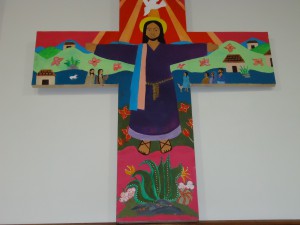A commentary on Mc 9, 2-8: Second Sunday of Lent, March 1st 2015
In this second Sunday of Lent, we continue reading Mark, but jumping from chapter one to chapter nine, in which Jesus appears nearing Jerusalem, where he is going to have a deadly conflict with the authorities. As always, this texts offers us many point of meditation. I take just three of them:
1) To assume the cross: How difficult it is!
A few verses before this text we read today, Jesus, whom Peter has recognized as “the Christ”, begins to tell the disciples that he is going “to suffer a lot”. The disciples refuse to enter into this perspective: It cannot be that the Messiah has to be killed, and furthermore they are not ready for that; rather, they are thinking of becoming the “chiefs” of the new kingdom Jesus is proclaiming.
Jesus’s reaction is straight: he calls Peter “Satan”, because he represents the temptation of disobedience to the Father, the same temptation Adam had, as well as Israel in the wilderness. Bearing that in mind, we can understand better the scene that Mark is narrating in today’s gospel: Jesus takes by hand his intimate ones and goes with them to the mountain.
I think that we, as the disciples, have great difficulty in accepting the way of the cross, the suffering that goes with our faith-vocation, de failure…That of Jesus, in first place, but specially our own. None of us wishes to suffer, even for a good cause. We think that suffering is “a punishment form God” and we react against it. But it is in those moments, when we do not understand what is happening to us and do not feel like going to church, that we most need to be taken by hand and pray that God reveals to us his nearness and the meaning of what we are experiencing.
 2) The Mountain: Divine perspective
2) The Mountain: Divine perspective
Jesus takes his intimate ones to the mountain, they alone. There the disciples have a very especial experience, in which I would like to underline these elements:
-The mountain: Place of God’s revelation in almost all religions. It implies going away from every day’s routine, to get in touch with a non-manipulated nature; a place that helps human beings to go beyond themselves and a self-controlled society; a place where it is possible to open oneself to new realities, including the divine mystery…
-Intimacy: Jesus tries to share with his disciples the most intimate side of his personality, his life and mission. On the mountain he goes beyond the topics and superficialities… Jesus gives out the deepest side of himself: “You are my friends… Whatever I hear from my Father, I tell you”.
-No publicity: Jesus does not want any publicity or communication outside the group. Even, later, he will command them not to tell anybody what they have experienced. There are experiences that one has to keep for himself or, at the most, for the very friends. Those experiences are not to be exposed on TV or even in churches. “Go into your room, close the door and pray to your Father who sees you in the secret of your heart”. Certainly: there are moments for witnessing and communicating, but there are also moments to be completely alone in the face of God “alone”.
3) “This is my beloved Son. Listen to him”
The evangelist narrates a marvellous scene, difficult to understand in its details from our today’s culture, but the global sense is quite clear:
-The disciples come to see Jesus in a new dimension, beyond their experience of him as a man from Nazareth and a wonderful preacher. It is the same experience that Sat Paul narrates in the letter to the Galatians: “The Father has revealed his Son in me”. It is the paschal experience that helped the disciples to understand the way of the cross and the real meaning of Jesus’ personality and mission. It is the experience we have when we “feel” Jesus alive and present in our lives.
-Moses and Elijah talk to Jesus: New and Old Testaments are part of the same story, the same salvation plan. To understand Jesus you have to read the Old Testament and to fully understand the Old Testament you have to listen to Jesus.
-“How good to remain here”: Once and again, the disciples of Jesus, of all ages, experience that the nearness of Jesus warms their hearts. This happened to the ones going to Emmaus, happened to Paul, to many saints and also to us in many occasions. To meet the Lord, on “the mountain”, produces in us a sense of fulfilment and direction, of having somebody always on our side.
-“This is my beloved Son. Listen to him”. The disciples understood that in his friend and Teacher, God was revealing himself in a clear and unique way. We all search for God and for meaning (for a definitive love) blindly and among doubts. Some search in the teaching of, let’s say, Buda; others in new theories (New Age); others still in pleasure, or pride, or success… The disciples had the experience that in Jesus they could see the face of the Father and the best guide for his own life. We are on the steps of those disciples and pray that the Spirit is renewing in us that experience, for our own sake and for the sake of others to whom we are called to be witnesses and missionaries.
Fr. Antonio Villarino
Rome



